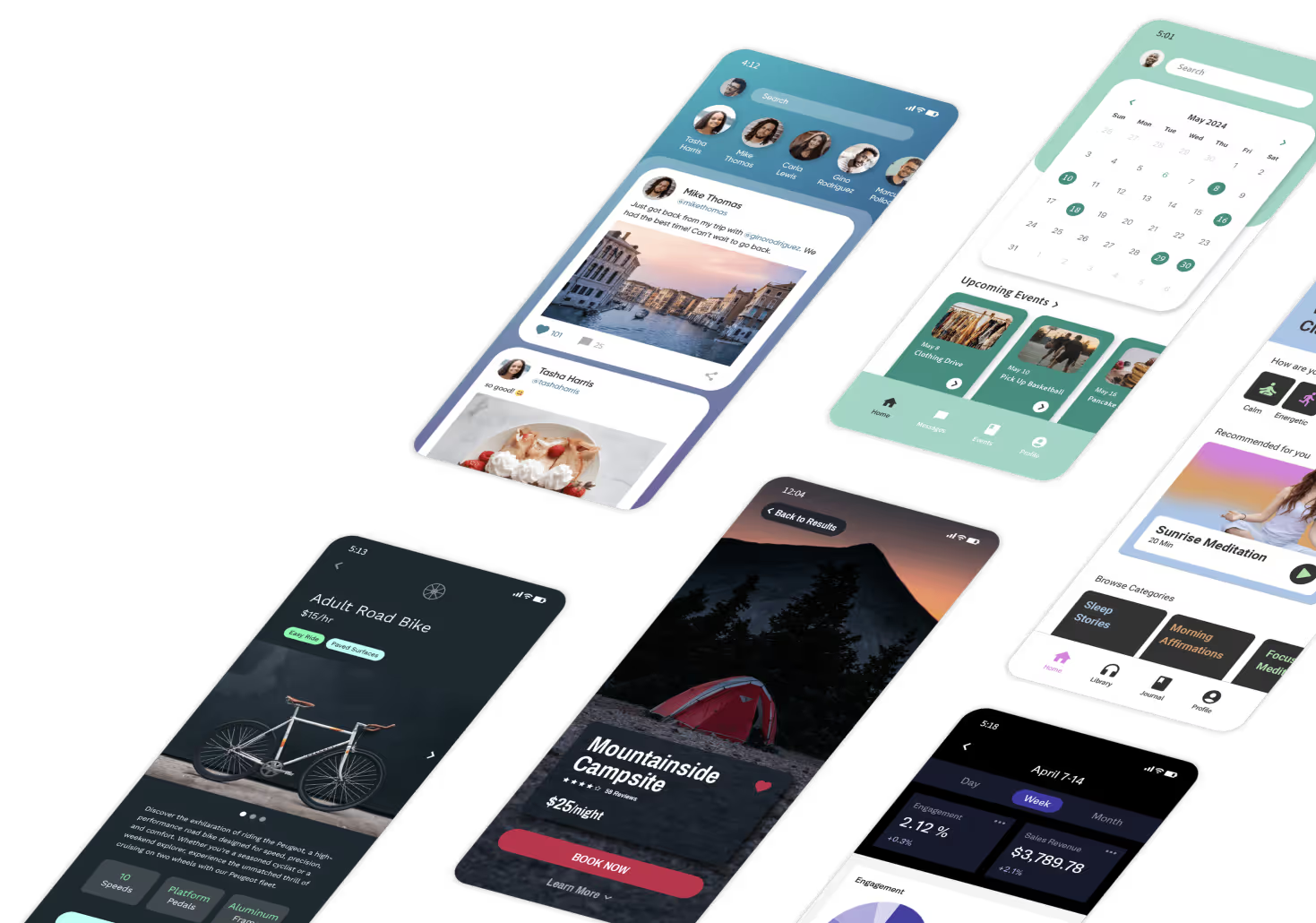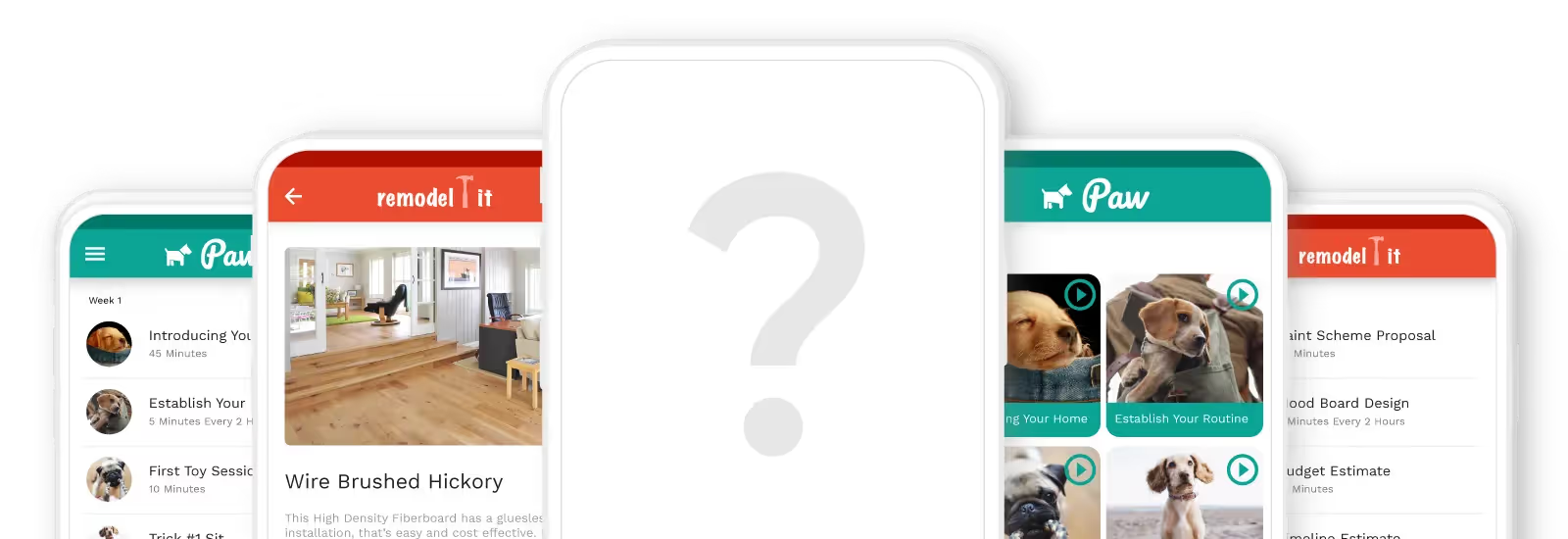Today, creating your very own app is a cinch. You won’t need any coding, programming, or technical skills to do so — the hardest part of building a no-code app is selecting the right no-code tool for you.
Selecting a no-code app builder is tough because loads of them exist. If you’re having trouble picking the right one, you’ve come to the right place. For over a decade, I’ve helped individuals, professionals, and organizations find the best no-code app builder to suit their needs.
I’ve recommended one no-code app builder more than any other: Adalo. In this article, I’ll give you an overview of Adalo, and why it’s the best platform for no-code app development.

What is Adalo?
Adalo is a no-code app-building platform. After you sign up for Adalo, you’ll build your app directly from your online Adalo account. You won’t need to download any software to your computer; you’ll only need an internet connection.
You don’t need to know any coding, programming, or technical skills to use Adalo. When it comes to actually constructing your app, Adalo leverages a drag-and-drop interface that’s very similar to PowerPoint, instead of writing lines of code over and over again.
Why Adalo Is the Easiest No-Code App Development Platform Out There
I’ve recommended Adalo more than any other no-code app builder because of its simplicity. Adalo virtually has no learning curve: Its intuitive building interface allows you to start building immediately after you open an account.
Types of Apps You Can Build with Adalo
Adalo gives you the power to breathe life into any app idea: This is another reason why I’ve recommended Adalo more than any other no-code app development platform. There are nearly no limits to the types of apps you can create or their functionality.
Today, 3 types of apps exist. Many no-code app development platforms can only make one or two of these app types. Adalo, however, can make all 3:
- Web Apps: These are apps that you access on your browser. They’re essentially websites that execute tasks, like a social media site that lets you share photos, a restaurant app for appointment booking, and more.
Just like visiting a website, you’ll need an internet connection to use web apps. Some web app examples include X (formerly Twitter), Zillow, or an online banking site.
- Progressive Web Apps (PWAs): You download PWAs directly to your phone from a link or QR code. Although they live on your phone (like web apps), you might need to have an internet connection to unleash PWA’s full potential.
- Native Mobile Apps: When most people think of apps, they think of native mobile apps, which are the ones you download from the Apple App Store or Google Play Store directly to your phone.
Native mobile apps run on your phone's processors. They can access your phone’s camera, GPS, and microphone, making them the most powerful type of app.
Importantly, native mobile apps must pass a thorough vetting process to become available for download on the app stores. This process increases the chances that they function properly and don’t contain any malware.
When you get an app from the app stores, you’re most likely getting a high-quality app that doesn’t crash every 10 seconds and won’t infect your device with malware.
All apps have three main parts, and Adalo also lets you create and customize each one:
- The Frontend: The part of your app that users see, touch, and interact with — the frontend includes your apps screens, images, buttons, forms, and more.
- The Backend: This is your app’s brain. It responds to user requests, like sending a completed order form from your client-facing restaurant to the app your kitchen staff sees. Your backend also connects to third-party apps and software.
- The Database: Your app’s database is its memory bank. All information about your app’s products, content offerings, and users will go directly to your database.
When I say you can breathe life into any app idea with Adalo, I’m serious. Here a some of the apps you can create using Adalo:
- An ordering app for your restaurant.
- A social media app for Akita owners.
- A CRM app for your business, complete with a directory featuring profiles of every client.
- An accounting tool that takes data from your QuickBooks, FreshBooks, or NetSuite accounts.
- An app for advertising your real estate listings.
- A booking app for your salon business.
…and the list could go on. But don’t take my word for it, check out Adalo’s app showcase and see some real-life examples for yourself.
Why Adalo Stands Out
While tons of no-code app builders are on the market, Adalo has some key features that make it stand out from the crowd. Adalo is one of the best app builders for people new to no-code app development or for no-code app development aficionados for the following reasons:
- Super Simple: This is yet another point that I can’t emphasize enough. Many no-code app builders have difficult learning curves, taking several months to get the hang of, much less master.
Instead of featuring simple drag-and-drop building interfaces, some app builders have complexity that requires homework and practice. But not Adalo.
As I said before, Adalo is simple enough to use right out of the box. Its building interface is truly drag-and-drop and intuitive enough to learn without watching tutorial videos or reading help documentation.
- Large Ecosystem: While Adalo is simple for getting started, you’re bound to have a few questions and hit some snags during your app-building journey, such as when you want to connect an API or integrate with another app.
Luckily, Adalo has an enormous community of users, which you can connect with and be a part of on The Adalo Forum.
To learn some of the more intricate features of Adalo’s app-building interface, such as integrating with third-party apps and collecting data from external sources with APIs, look no further than The Adalo App Academy.
Another part of Adalo’s ecosystem is the Adalo developer community. These technical folks create tools like PDF readers and animations that can supercharge your app's functionality.
- Competitive Pricing: Compared with other no-code app-building platforms, Adalo is one of the most competitively priced. Even its cheapest tier, at $36/month, allows you to publish your app to the app stores and launch it on the web with your domain.
If you need more power, Adalo has pricing options to meet your needs. Its $52/month version lets you publish two apps and gives you access to Adalo’s powerful Rest API. Use this to gather data from sources across the web to give your app more functionality.
- Publishes Both Web Apps and Native Mobile Apps: The ability to publish both web apps and native mobile apps is a feature that many no-code app-building platforms simply don’t offer.
When most people think of apps, they conjure up images of the native mobile kind that you download right to your phone from the Apple App Store or Google Play Store. Because of this association, many people prefer to build native mobile apps.
You’ll also be able to publish native mobile and web versions of your app, which people can download from app stores and access using browsers on their phones, desktops, or tablets.
While your web app version won’t be as powerful as your native mobile app (it won’t be able to use the device’s camera or GPS), you’ll still be able to extend your app’s reach, opening up the possibility of getting more users.
Who Should Use Adalo?
Adalo is best suited to meet the needs of freelancers, entrepreneurs, and small and medium businesses. Whether you want a native mobile app downloaded by 1,000s or an easy project management tool for your consulting team, Adalo’s got you covered.
And, as I’ve said time and time again, you don’t need any technical expertise or knowledge of a coding language to use Adalo. Adalo is a no-code app-building platform that’s designed to let even the most tech-allergic luddites create professional, high-quality apps.
Adalo's Features and Components
Packed with special features and unique components, Adalo has the tools you need to bring any app idea to life. Here are just some of Adalo’s powerful components you’ll have at your fingertips:
- Preloaded Templates: Before you start building, Adalo gives you the option to choose from over 35 pre-made templates. Each one has all the screens, elements, and features you’ll need–you’ll even get a premade database.
- All you need to do is customize each template to match your brand: Change the colors and images, rearrange the layout, and add any other feature you want — Adalo gives you nearly pixel-perfect design freedom.
- Generous Free Version: Some no-code app development platforms offer watered-down free versions that only let you get the feel of the building interface. Adalo, however, doesn’t: Adalo lets you publish the app you make with its free version as a web app, so you can get immediate visitors.
Adalo’s free version also offers its Stripe integration. This is very useful If you release an app that takes payments, like one for e-commerce or your periodical subscription.
- Tons of Integrations: Adalo's Stripe integration for payments is just the tip of the integration iceberg. You’ll also be able to integrate your Adalo app with QuickBooks, MailChimp, Zoom, and more, bringing their power right to your app.
But the integrations don’t stop there. If you have an Airtable database, you can seamlessly connect it to Adalo. Moreover, if you want to build your backend with Xano for Adalo’s $160/month Team Plan or $200/month Business Plan, Adalo will cover the $99/month fee for a Xano account!
One last integration Adalo has is the crown jewel of all integrations: An integration with Zapier. This lets you connect over 5,500 third-party apps and programs to your Adalo app, letting you gather data and harness tons of power.
How to Get Started
Now that you know why Adalo is the best platform for easy no-code development, you can get started by signing up to Adalo for free.
After navigating to the link, Adalo will let you select a template. Choose a template that best suits the type of app that you want to create. Remember, you’ll be able to customize nearly every bit of your template so that your app meets your exact needs and tastes.
You’ll be amazed at the level of ease that Adalo offers. If you run into any issues, remember to check out the Adalo Forum, Tutorials, and help guides. To help guide you through building your app, I put together a useful guide full of in-depth app-building instructions and tips.
Best of luck, and enjoy your app-building journey!












.png)
.png)

